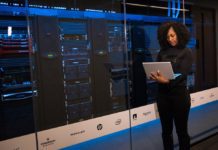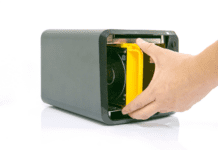See the full list of 8 Best Enterprise NAS Devices
Bottom line:
The NetApp FAS9000 clearly belongs in the high end of the NAS hierarchy. With NVMe flash and high-performance backed by NetApp’s long-track record of NAS leadership, this unit should be on the short list of anyone looking for the top end of the NAS space.
Naturally, its price is also high. So SMB buyers will probably not find this unit appropriate. But for large enterprises that need performance – and are willing to pay for it – this NetApp unit is a top choice.
Company description:
NetApp was originally known as Network Appliance. It went public in 1995. The company provides hybrid cloud data services that simplify management of applications and data across cloud and on-premises environments.
Product description:
NetApp FAS9000 can be configured either as a SAN or NAS and offers fast performance with NVMe flash. It can scale up to 24 nodes and features continuous availability, built-in encryption and simplified management with NetApp ONTAP data management software. According to the company, it’s up to 50 percent faster than previous-generation hardware.
Powered by NetApp ONTAP data management software, the FAS9000 unifies your SAN and NAS storage infrastructure. Designed to take advantage of 40GbE and 32Gb FC, the FAS9000 is the most powerful FAS system that NetApp has ever created.
Key Features:
- Reduce latency and speed operations with up to 50% higher performance
- Eliminate planned downtime. Add, upgrade, or retire storage with no disruptions
- Streamline maintenance and upgrades with a modular design.
- Scale up to a 138 PB cluster with NetApp AFF systems, and integrate existing third-party storage arrays
- Easily reconfigure to meet changing performance, capacity, and connectivity requirements.
- 1024 GB RAM
- Support for up to 12 nodes
- Encryption
- Replication
RAID/Data Protection features:
- 6 X 9s availability or greater.
- Synchronous replication
- Support for RAID-TEC, RAID 6, RAID 4, RAID 6+1 or RAID 4+1
- NetApp MetroCluster technology expands data protection to eliminate the risk of data loss by synchronously mirroring data between locations for continuous availability of information.
Storage Saving Features:
- Inline deduplication, inline compression, inline compaction, thin provisioning, and space-efficient NetApp Snapshot Data Management features: Predictive analytics
- A single namespace can grow to 20PB and 400 billion files while maintaining consistent high performance and resiliency
- QoS
- Multi-tenancy
- Public cloud integration
Implementation:
• The FAS9000 system is easily implemented, with setup consisting of a few steps. Users are able to deploy the system in minutes after taking the product out of the box.
“NetApp and their partners have always made implementation easy,” said a storage architect in the manufacturing industry. Their products contain more features than we need, the features we use work as advertised.”
Technical support:
• NetApp offers comprehensive support with various levels of service.
• One user, however, complained about Level 1 support not being as responsive nor competent as he wanted. As a result, he had to pay more for a higher level of support.
Capacity:
Up to 192 TB onboard NVMe Flash Cache and a raw capacity of 172 PB.
Performance:
The base configuration includes 2 TB of onboard NetApp Flash Cache that is based on NVMe technology. This can be expanded with up to 16 TB of onboard NVMe flash and up to 144 TB of hybrid flash by using NetApp Flash Pool intelligent data caching.
It offers 500,000 IOPS and 17 GB/s performance.
“Cost was high but product works well,” said a system engineer in the manufacturing field.
Delivery:
The product is delivered through hardware but is capable of supporting software. That is, it is a modular chassis where every component can be changed individually – allowing the user full customization per their own needs. Specifically, the CPU controllers have been completely decoupled from I/O modules and NVRAM.
Markets and Use Cases:
- The NetApp FAS9000 was designed for high performance and superior TCO, accelerating business-critical apps and streamlining IT. The ability to test, scale and move data nondestructively is accelerating time to market for new applications and services.
- As a result, a company is able to improve customer service by eliminating downtime for core business applications as well as reducing time to market for new applications and services.
Pricing:
Starting at around $100,000.
NetApp FAS9000
| Product | |
|---|---|
| Capacity | Up to 172 PB |
| IOPS/rpm | 500k |
| Throughput | 17 GB/s |
| Delivery | Appliance |
| Media | SSD/ NVMe |
| Price | Starting at $100,000 |
| Differentiator | High performance |





